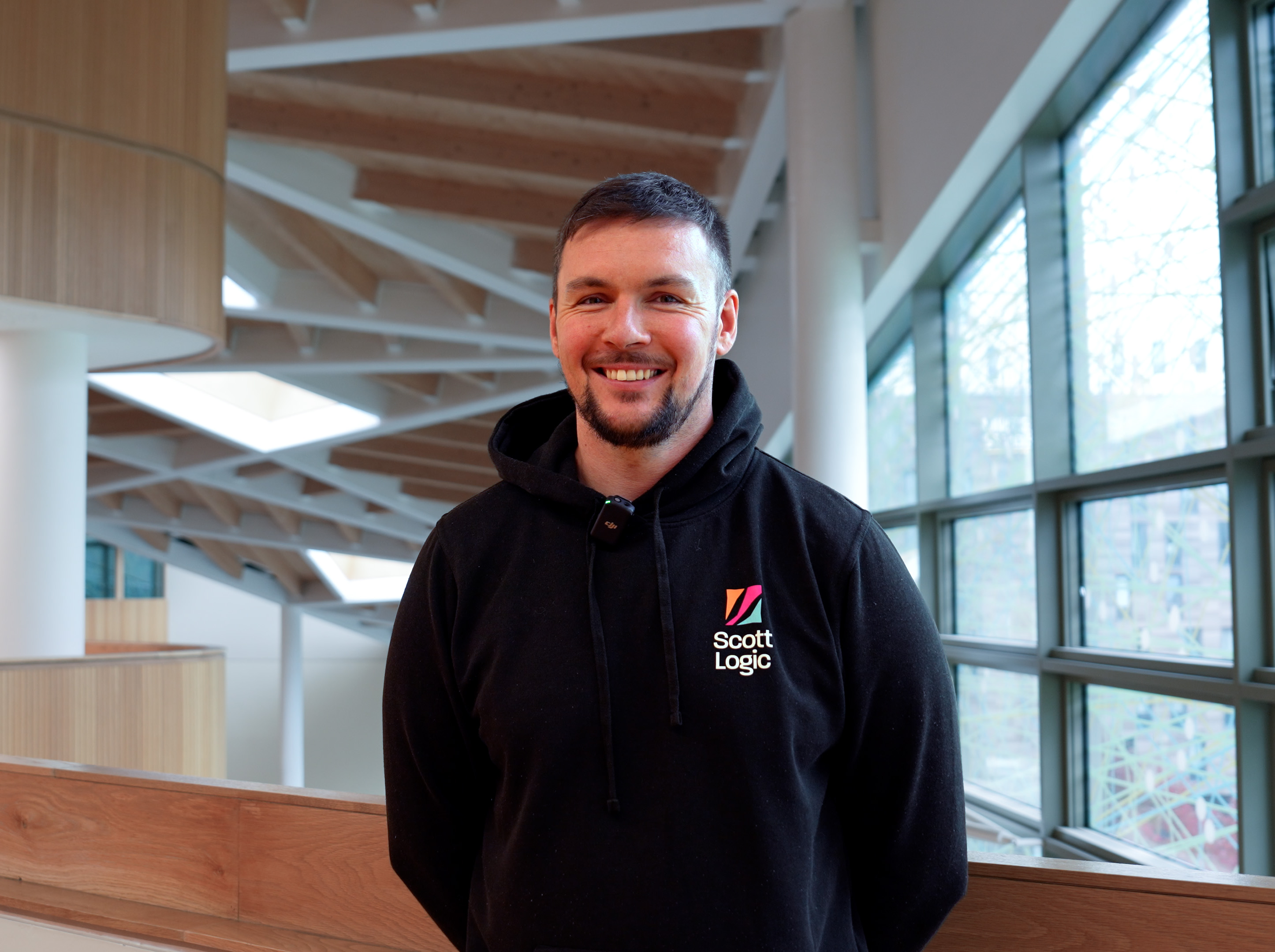Advanced Computer Science MSc
- Study mode and duration
- Course code
- 5178f
- Fees (per year)
- Typical entry requirements
-
View full entry requirements - Course delivery
- On Campus
Course information for entry year:
Overview
Enhance your technical knowledge of computer science while gaining practical experience by applying cutting-edge techniques to real-world challenges.
This programme offers an exciting opportunity to deepen your expertise and explore cutting-edge topics like:
- artificial intelligence
- machine learning
- Internet of Things
- cyber security
You'll benefit from the flexibility to tailor your studies to your interests and career goals. With a wide selection of modules to choose from and a range of options for your final project, this course helps you choose your own path in the fast-evolving world of computer science.
You’ll gain a well-rounded research training in computer and information systems, providing a basis for PhD study. You'll also develop your technical and professional skills to underpin personal development and future career success.
The MSc Advanced Computer Science is demanding and rewarding. It has close links to ongoing research in the School of Computing. We have leading international research groups and three research centres focusing on a wide range of computer science fields, including:
- security and resilience
- dependable systems
- cybercrime
- cloud computing and edge
- Internet of Things
- machine learning
This Advanced Computer Science Master's is designed for honours graduates in computer science. You can also be a graduate from a discipline with a significant computing component such as:
- artificial intelligence (AI) and machine learning
- AI safety
- engineering
- systems engineering
- mathematics
- DevOps
- data science and visualisation
We also value relevant industrial computing experience and transferable skills.
We are a hub of digital innovation. You'll benefit from our:
- leadership of the National Edge AI Hub, next-generation innovations via edge computing
- recognition as an Academic Centre of Excellence in Cyber Security, supported by the National Cyber Security Centre and the EPSRC
- direct link with the UK's National Innovation Centre for Data
- partnership with The Alan Turing Institute, the UK’s national institute for data science and AI
Important information
We've highlighted important information about your course. Please take note of any deadlines.
Please rest assured we make all reasonable efforts to provide you with the programmes, services and facilities described. However, it may be necessary to make changes due to significant disruption, for example in response to Covid-19.
View our Academic experience page, which gives information about your Newcastle University study experience for the academic year 2025-26.
See our terms and conditions and student complaints information, which gives details of circumstances that may lead to changes to programmes, modules or University services.
Quality and ranking
All professional accreditations are reviewed regularly by their professional body
If you’re studying an accredited degree and thinking about working in Europe after you graduate, the best place to find current information is the UK Government’s guidance on recognition of UK professional qualifications in EU member states. This official resource explains whether your profession is regulated in another country, what steps you need to take, and which organisation you should contact.

What I love most about the MSc in Advanced Computer Science is how customisable it is; with so many optional modules, I’ve been able to tailor my studies to my interests in areas like AI and cybersecurity. Studying at Newcastle has not only allowed me to grow academically, but to also build practical skills that will benefit my future career.
What you'll learn
Topics are taught at an advanced level. The topics link closely with the research strengths of the School. This means we'll introduce you to the latest developments. You'll focus on both the theory and application of the associated techniques.
The topics covered include:
- advanced programming
- distributed algorithms
- safe and dependable systems
- security and trust
- cyber-physical systems
- cloud computing and edge
- Internet of Things
- data science
- AI and machine learning
- human factors engineering
A team project is also incorporated into the course to provide an opportunity to develop teamwork skills.
Modules
You will study modules on this course. A module is a unit of a course with its own approved aims and outcomes and assessment methods.
The module information below is intended to provide an example of what you will study.
Our teaching is informed by research. Course content changes periodically to reflect developments in the discipline, the requirements of external bodies and partners, and student feedback.
Full details of the modules on offer will be published through the Programme Regulations and Specifications ahead of each academic year. This usually happens in May.
To find out more please see our terms and conditions.
Optional modules availability
Some courses have optional modules. Student demand for optional modules may affect availability.
| Compulsory Modules | Credits |
|---|---|
| Research Methods and Group Project in Advanced Computer Science | 20 |
| Project and Dissertation for MSc in Advanced Computer Science | 90 |
How you'll learn
You’ll be taught using a range of methods, including:
- lectures and seminars
- practical, hands-on work in labs
- team and individual projects
You’ll be encouraged to deepen your understanding through guided, independent reading and study.
Depending on your modules, you'll be assessed through a combination of:
- Case study
- Computer assessment
- Design or creative project
- Dissertation
- Essay
- Professional skills assessments
- Oral examination
- Practical lab report
- Problem-solving exercises
- Report
You'll complete an individual project aligned with one of our research groups. You can also propose your own project based on the modules you have studied. This 90-credit project gives you an opportunity to develop your knowledge and skills in depth.
You'll be supervised by an experienced staff member. Depending on the project, you'll have the opportunity to work with industry partners.
Our experienced and helpful staff can offer support with all parts of your course, from admission to graduation and career development.
The School of Computing has a dedicated Wellbeing Advisor who understands the needs of our students.
They can be a confidential listening ear and provide guidance on a range of wellbeing issues.
Throughout your studies, you’ll have access to support from:
- academic staff
- personal tutors and research supervisors
- our University Student Services Team
- student representatives
- peers
You'll also be assigned an academic member of staff, who will be your personal tutor throughout your time with us. They can help with academic and personal issues.
Your teaching and learning is also supported by Canvas. Canvas is a Virtual Learning Environment. You'll use Canvas to submit your assignments and access your:
- module handbooks
- course materials
- groups
- course announcements and notifications
- written feedback
Our academic staff have international reputations for their contributions to the field and some have extensive experience as practitioners in industry.
Your development
Practical skills
You'll develop advanced practical skills tailored to your chosen areas within computer science. You'll learn to design, model, and implement complex computer-based systems, applying engineering principles to tackle a wide range of technical challenges.
You’ll graduate with the confidence to manage a research project from conception to completion. You'll bring together everything you’ve learned in a practical, real-world context.
Professional skills
You'll gain transferable skills that are valuable across a wide range of careers, including:
- communication
- teamwork
- creative and critical thinking
- time and resource management
- using digital tools adaptability
Entry requirements
The entrance requirements below apply to 2026 entry.
Qualifications from outside the UK
English Language requirements
Admissions policy
This policy applies to all undergraduate and postgraduate admissions at Newcastle University. It is intended to provide information about our admissions policies and procedures to applicants and potential applicants, to their advisors and family members, and to staff of the University.
University Admissions Policy and related policies and procedures
Credit transfer and Recognition of Prior Learning
Recognition of Prior Learning (RPL) can allow you to convert existing relevant university-level knowledge, skills and experience into credits towards a qualification. Find out more about the RPL policy which may apply to this course
Your future
What are the job opportunities after completing an MSc in Advanced Computer Science?
Our Advanced Computer Science Master's will provide you with the skills to pursue a career in a range of different roles. You'll also be able to undertake basic research or establish your own consulting or software development company.
Graduates from this course have undertaken various roles including:
- Big Data Engineer at Microsoft
- Bioinformatics Developer at Anthony Nolan
- Computer Programmer at Agriculture Bank of China
- Geo Technical Technician at IBM
- Blockchain Engineer at Purple Mountain Laboratories
Further study
This course provides a route into PhD level study, offering a well-rounded knowledge in both theoretical and applied aspects of Computer Science. As a graduate, you'll be prepared to pursue advanced research opportunities and contribute to the academic community through doctoral programmes.
Industry links
This programme is shaped by our Industrial Advisory Board (IAB), which includes leaders from:
- Meta
- Airbus
- Defence Science and Technology Laboratory (DSTL)
- JP Morgan
- Lloyds Bank
- PwC
- IBM
The IAB and our links with industry ensure our course content stays relevant to current trends and technologies. The IAB also creates valuable opportunities for students, such as guest lectures, industry-led projects, internships, and potential job pathways.
Our Careers Service
Our expert Careers Service is here to help you take the next steps in your professional life. We will support you while you’re studying with us and for up to three years after you graduate.
You will have access to expert one-to-one advice and guidance through our campus careers centre and online, along with digital resources, workshops, networking opportunities, and careers and recruitment events.
We’ve been awarded 5 QS Stars for Student Employability (2025). Many of our degrees are shaped by strong links with national and international businesses. We are committed to helping you access real-world experience opportunities and develop key skills through paid work placements and internships.

We do have a really good track record with Newcastle, we have a long-standing link. I think the quality of graduate that comes out of Newcastle is always really good, they always come to us a little bit more polished.
Facilities
You'll have access to the latest tools in:
- security analysis
- cloud development
- machine learning
- system development
Urban Sciences Building
The School of Computing is based in the £58 million Urban Sciences Building (USB), a flagship development located on the £350 million Newcastle Helix regeneration site in the heart of Newcastle. It brings together:
- academia
- the public sector
- communities
- business and industry
Postgraduate student facilities
As a Master's student, you'll have access to specialist teaching spaces and facilities in the USB. These are only available to postgraduate students.
Wellbeing and inclusivity are at the heart of our School. The USB has several wellbeing spaces for students, including:
- The Retreat: A sensory space with relaxing stimuli to distract from busy student life.
- Wellbeing room: Designed for relaxation and quiet time. Here you can take a moment to breathe and unwind. It can also be used by students with special medical requirements.
- Prayer room: For all faiths and none, this space can be used for prayer or quiet reflection.
Fees, Funding and Scholarships
Tuition fees for 2026 entry (per year)
As a general principle, you should expect the tuition fee to increase in each subsequent academic year of your course, subject to government regulations on fee increases and in line with inflation.
Depending on your residency history, if you’re a student from the EU, other EEA or a Swiss national, with settled or pre-settled status under the EU Settlement Scheme, you’ll normally pay the ‘Home’ tuition fee rate and may be eligible for Student Finance England support.
EU students without settled or pre-settled status will normally be charged fees at the ‘International’ rate and will not be eligible for Student Finance England support. You may be eligible for a scholarship worth 25% off the international fee. Search our funding database.
If you are unsure of your fee status, check out the latest guidance here.
Scholarships
We support our EU and international students by providing a generous range of Vice-Chancellor's automatic and merit-based scholarships. See our searchable postgraduate funding page for more information.
What you're paying for
Tuition fees include the costs of:
- matriculation
- registration
- tuition (or supervision)
- library access
- examination
- re-examination
- graduation
Find out more about:
If you are an international student or a student from the EU, EEA or Switzerland and you need a visa to study in the UK, you may have to pay a deposit.
You can check this in the How to apply section.
If you're applying for funding, always check the funding application deadline. This deadline may be earlier than the application deadline for your course.
For some funding schemes, you need to have received an offer of a place on a course before you can apply for the funding.
Search for funding and scholarships
Find funding available for your course
How to apply
Using the application portal
The application portal has instructions to guide you through your application. It will tell you what documents you need and how to upload them.
You can choose to start your application, save your details and come back to complete it later.
If you’re ready, you can select Apply Online and you’ll be taken directly to the application portal.
Alternatively you can find out more about applying on our applications and offers pages.
Apply Online
Open days and events
Find out about how you can visit Newcastle in person and virtually
Overseas events
We regularly travel overseas to meet with students interested in studying at Newcastle University.
Get in touch
Questions about this course?
If you have specific questions about this course you can contact:
Admissions Secretary
Telephone: +44 (0) 191 208 2736
Email: computing.admissions@ncl.ac.uk
School of Computing
ncl.ac.uk/computing
General enquiries
For more general enquiries, you could also complete our online enquiry form.
Application enquiries
If you've got a question about your application, send us an enquiry via the application portal you applied through.
If you haven't applied yet, you can send your questions via our enquiry form.
Live chat
Our Ncl chatbot might be able to give you an answer straight away. If not, it’ll direct you to someone who can help.
You'll find our Ncl chatbot in the bottom right of this page.
Chat to our students
Choosing a university is a big decision. If you've got questions about a particular course, student life or the city of Newcastle, why not chat to our friendly students or graduates!
Keep updated
We regularly send email updates and extra information about the University.
Receive regular updates by email
Social media
Get involved with the School of Computing social media.
